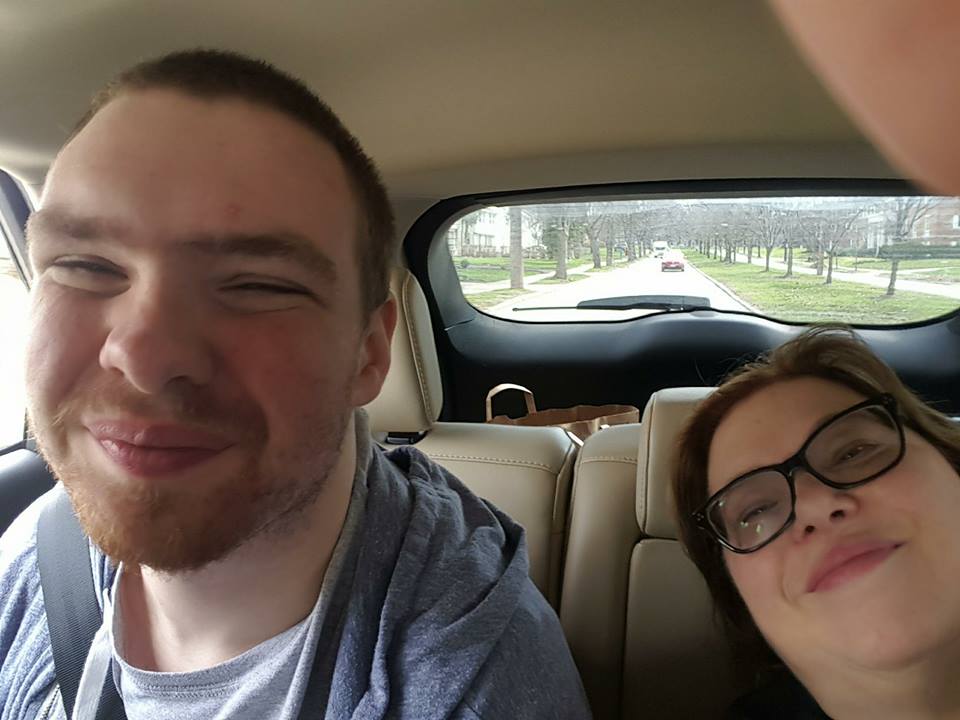 Ben and Mom in the back seat, heading to his favorite bakery.
Ben and Mom in the back seat, heading to his favorite bakery.
(pic by Karen)
For this Autism Awareness Month, and every other month, I want to say – I GET IT.
I really do. Depressing news stories about autism without happy endings don’t boost ratings or sell more copies. That is why we rarely see them in the mass media. A recent story on Cleveland’s Fox 8 News — the town’s local Fox affiliate — is only one of countless examples of what we see instead.
One end of the autism spectrum can make for compelling drama. “The Good Doctor,” for instance, is a new TV show about an autistic MD. I’ve heard it’s uplifting, inspirational, emotionally gripping, and entertaining. I haven’t seen it. I’m currently re-watching Breaking Bad. Five extraordinary seasons and not once is the word “autism” uttered. My kinda show.
I know the value (beyond advertising revenue) of presenting success stories, either real or fictional, of people who have come out of severe autism to lead fulfilling, independent lives. It gives hope to thousands of parents, and encourages them to explore treatments and interventions and to not give up. No parent should give up.
Because there IS hope. People do get better, sometimes on their own, and many through a variety of treatments, therapies, interventions, and professionals specializing in autism that were simply not available, or hardly available, a couple of decades ago. Insurance companies often cover at least some of the costs, another huge factor. In the bad old days, if you didn’t have tens of thousands of dollars every year to throw at the problem, the child went without, or bankruptcy awaited.
But so has the number of people with autism exploded. (This is disputed in some circles, where changes in diagnostic criteria are cited for the increased numbers, but autism is a rare example of anecdotal evidence and simple observation of the world around us swamping “empirical,” and faulty, thinking.)
I have written about this issue already, many times, and I’ve been careful to strike a conciliatory, balanced tone, knowing how this topic can inflame or hurt many who disagree with me. (Heck, I run a department of mediators – seeing both sides is central to my profession and my nature.) But my patience has dwindled, especially after our side has been on the receiving end of blistering nastiness by many of those who disagree. I have often chalked this up in part to the autism hallmark of lacking “empathy towards, interest in, and connection with other people”.
But frankly, I’m not addressing the “other side.” I’ve given up. I am writing this for the neurotypicals (aka “normies,” aka those of us without autism) who have yet to achieve full Autism Awareness, and especially those in the media and elsewhere who present autism to the wider world. Those offended by my stating the fact that autism absolutely is a devastating disorder for many people, and not simply “a difference,” usually have not been adequately exposed to a big chunk of the autism population, and are speaking from a place of ignorance. An afternoon – no, ten minutes – with our son Ben, who is 24, should be all they would need to understand this.
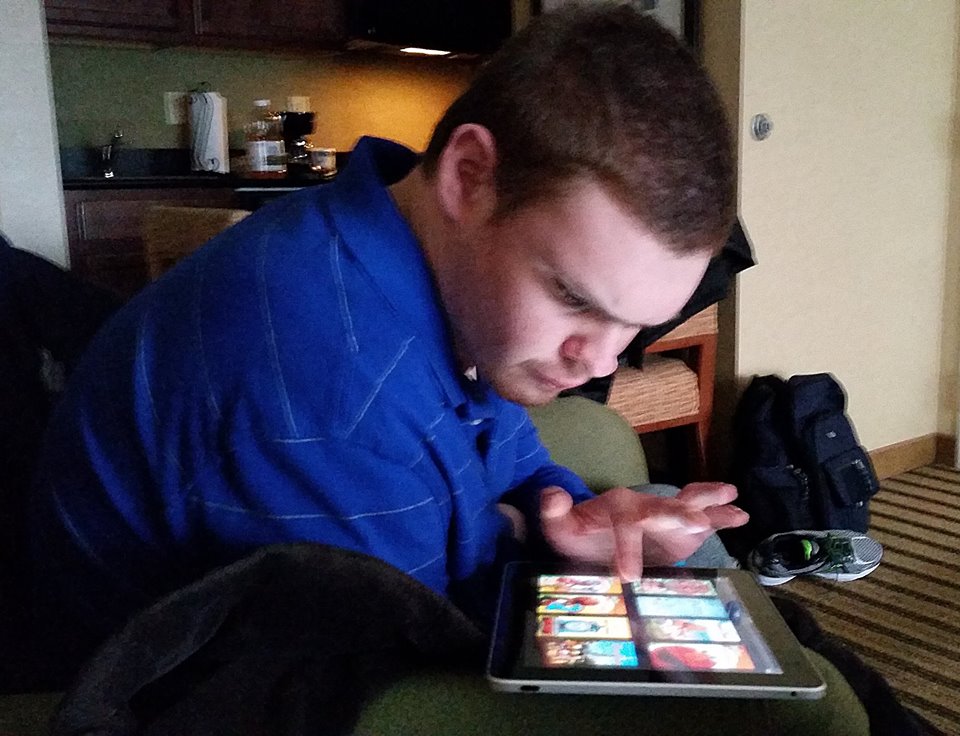
Ben and his iPad, choosing a Sesame Street video.
Or, ten minutes with one of the 600,000 people in the US like Ben. Find one and hang with them for a day (“them” because they can’t function and survive on their own and will have an aid of some kind with them).
“600,000? Really?”
Yes. 1.5 million people in the US have some degree of autism, and 40% of children with autism are nonverbal, to use only one type of diagnostic criteria. OK, yes, as I’ve already noted, some improve significantly to one degree or another. Let’s say half do, which would be a ridiculously optimistic estimate. That would still leave 300,000 people on the non-verbal end of the spectrum.
That’s the population of Pittsburgh.
Honestly, I wasn’t planning on writing about this – again – but the Fox 8 News piece got my goat – again.
We live in the Chicago area, but Illinois is absolutely horrible, bottom-of-the-barrel, for adults with disabilities. Ohio is a much better state for guys (and gals) like Ben, and he has become a permanent resident, in a group home. Karen and I have an apartment there, and for the past seven years, we’ve driven out every other weekend to see him, and we will eventually move there. Hey, who doesn’t dream of retiring to Cleveland?
Back to the news story. It was about an Israeli family that moved to the US because, they said, we have a better attitude, and better services, for autistic kids. There’s another example of the lengths families often must go to for their autistic children. Chicago to Cleveland? Pshaw — they moved from Israel to Akron.
But it was riding in his grandfather’s small plane that seemed to be the biggest factor in their son’s emergence, and he’s gone from severely autistic child to young man at Kent State studying to become a flight engineer.
So far so good. Success story. Hope for parents of autistic children, and that includes a weekend anchor on Fox 8’s morning news who has an autistic boy and has reported on autism. (We’ve exchanged e-mail, and she seems typical of many autism parents I’ve known – autism creates supermoms whether they feel like one or not.)
She’s talked on air about her family and about the plentiful services available these days and encourages people to seek them out and remain hopeful. She is speaking from experience and I agree with her and applaud her for using her platform to help parents in the same boat. And she should be hopeful – because it will serve her son to have a mom doing everything she can for him and because he might be a success story.
But the end of that segment on the Israeli-American family – Aargh!!!
“Autism doesn’t mean you can’t; it means you can and will — just a little differently.”
NO! NO! NO! NO! NO!
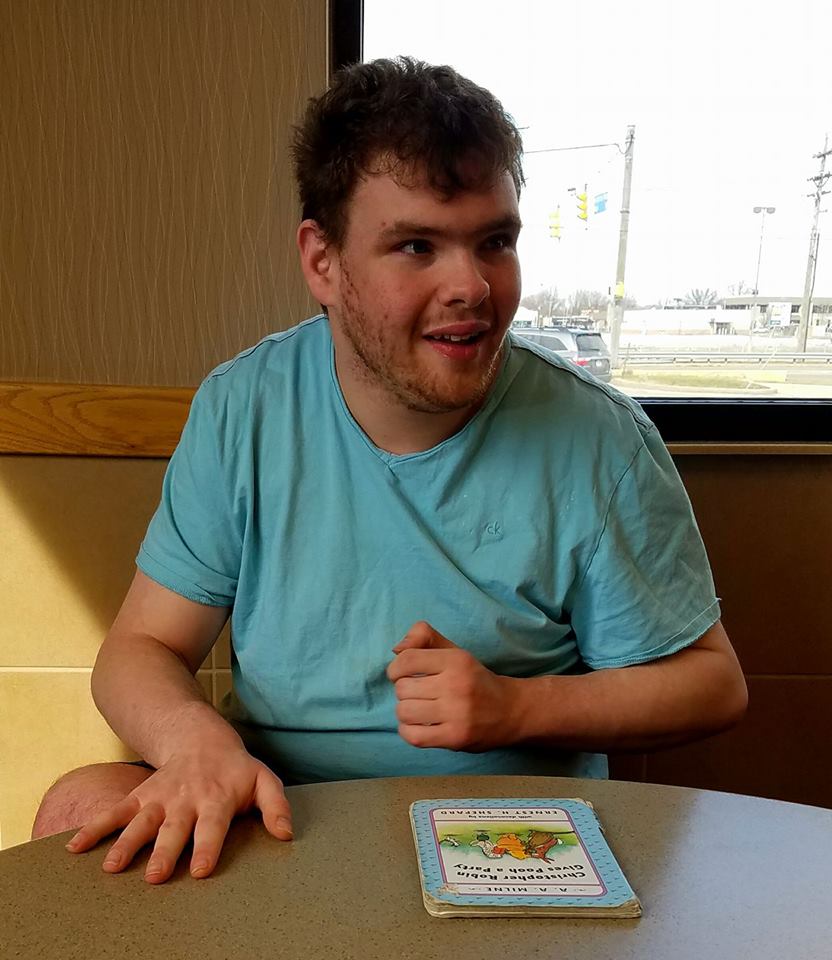
Ben and “Christopher Robin Gives Pooh a Party,” a favorite book.
“Just a little differently”?!?
And, autism means “you can and will” WHAT exactly?
Live in a setting where you can never, ever be left alone in your own residence? Maybe. Hit yourself hard in the head when frustrated and need to wear a protective helmet around the clock? Maybe. Wear adult diapers because – well, you know. Maybe. Never provide for yourself? Maybe. Never understand or care why you shouldn’t gorge on candy until you puke and then want to continue the gorging? Maybe. Can’t communicate wants or needs or pain or injuries or dangerous physical ailments? Maybe. Never get married and raise a family? Maybe. Never have sex? Maybe. Maybe, maybe, maybe, maybe, maybe…
Earn a doctorate? Maybe.
Earn a pat on the back for a job well done sorting hardware in a sheltered workshop? Maybe.
(One study reports that 55% while another reports 75% of those on the autism spectrum have IQ scores of 69% or lower and are diagnosed as intellectually disabled on top of their autism).
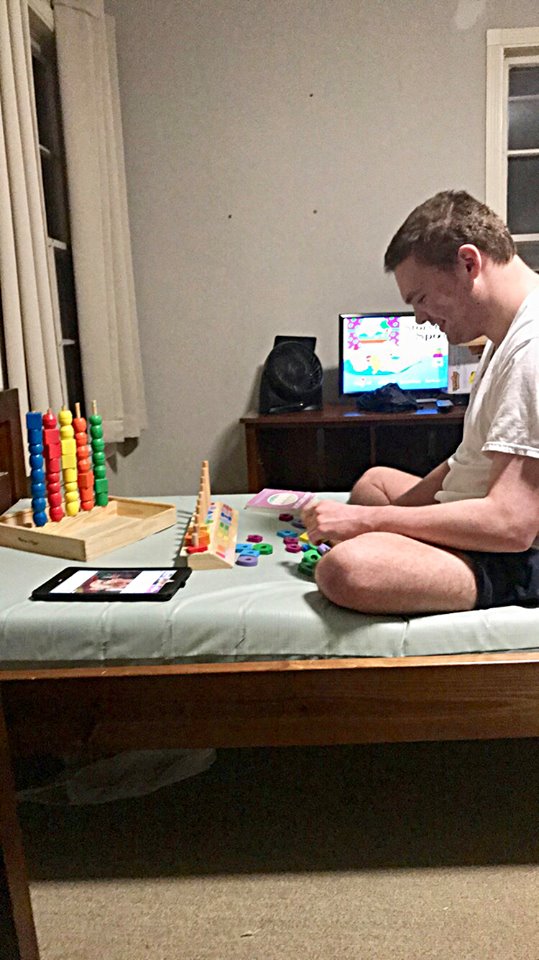
Ben and a favorite pastime.
(Pic courtesy of his aid, Michelle.)
For those somewhere on the autism spectrum, all of these “accomplishments,” great and rotten, are maybes. None are “cans and wills.”
And it is cruel to say otherwise.
Do you know what the cause was in the early days of Autism Unawareness, according to the medical world and “authorities” such as Bruno Bettelheim, for years lauded as the world’s leading expert on the disorder?
The Refrigerator Mother.
The mother of an autistic person wasn’t a loving, devoted, devastated, depleted, exhausted, heartbroken, and tireless parent, but a cold, unloving, emotionally distant shrew who caused her child’s autism. It was her fault. If she were different, her child would be different. Her child would be fine.
So proclaimed the mainly male medical world. The trusted authorities.
Imagine living with that.
No, we don’t believe that crap anymore. We know it was ridiculously bad “science.”
But absurd statements like, “Autism doesn’t mean you can’t; it means you can and will — just a little differently,” once again, unintentionally or not, aims blame directly at the parents. In our world of very uneven Autism Awareness, the Refrigerator Mother has been replaced – subtly but, for thousands of parents and loved ones, palpably.
“Autism doesn’t mean you can’t; it means you can and will — just a little differently.”
Oh yeah? Then what if your child “can’t and doesn’t,” unless you consider the hallmarks of a severely autistic existence to be what your son or daughter would want out of life?
What did you, Mom and Dad, do wrong? Why did you try this therapy, but not that intervention? Why didn’t you buy a Cessna and fly your child around? They might’ve been headed to grad school by now.
There’s something called Affinity Therapy that uses a child’s interests and passions as a way to help them reach their potential. For the young man in the news story, flight is his affinity. The approach is terrific, for some, and another example of things we have now that weren’t around before.
So, among others, are Applied Behaviors Analysis, Occupational Therapy, Social Skills Classes, Hippotherapy (horseback riding), Gluten Free/Casein Free Diet, Floor Time, Pivotal Response Treatment, Picture Exchange Communication System, Relationship Development Intervention, Aquatic Therapy, Behavior Therapy, Speech/Language Therapy, Floortime, Music Therapy, Sensory Integration Therapy, Special Education, Parent Management Training, each and every one with success stories and passionate fans and practitioners. Ben’s done many of them himself. And he is still severely autistic.
He’s been in a Boeing, but we have never had the opportunity to try a Cessna. Damn.
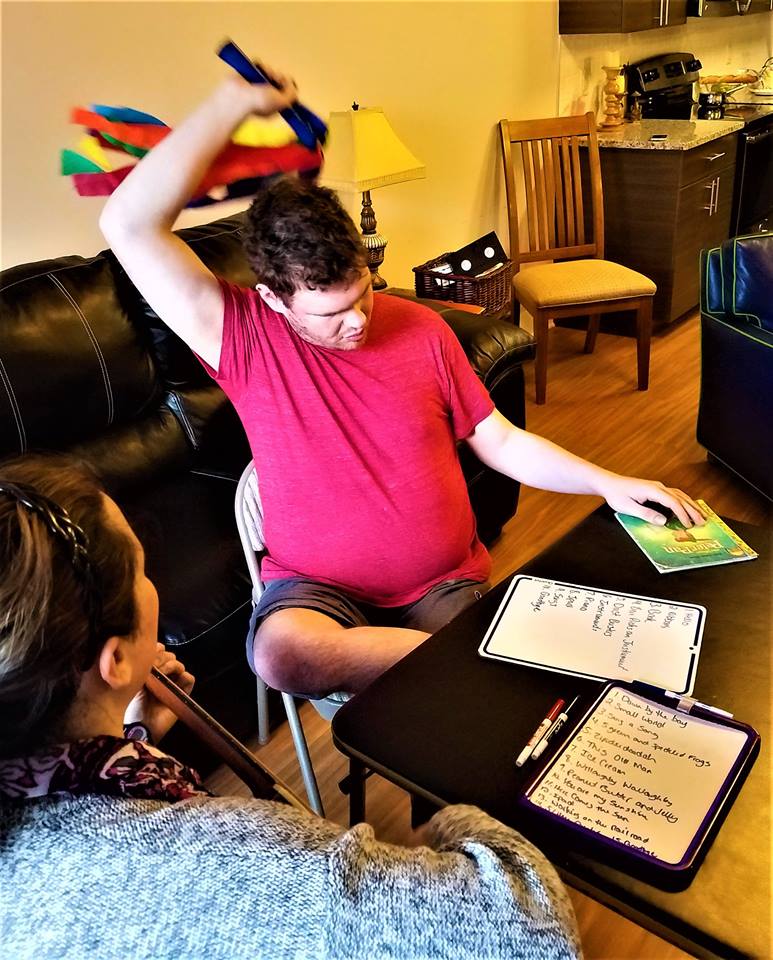
Ben LOVES Music Therapy.
We’ve been doing something like Affinity Therapy with Ben for years. It’s actually a pretty natural thing parents do, if only because all of us want to see our kids engaged in things they enjoy. Making it a therapy and extending and studying and maximizing it – all good.
But unfortunately, it’s no more an answer for many, many parents than the others.
22 years ago, after the shock to our systems that the autism diagnosis delivered, we moved into a hopeful stage, determined to make Ben an exception, to find some way to pull him from the jaws of this horrid disorder. We threw everything available at it. Like many, it ruined us financially, but we have zero regrets.
And we know that Ben’s condition is not our fault.
Autism has robbed him of what all of us would consider a decent life. Yes, he’s fortunate to be well attended to and develop meaningful relationships in an excellent environment, which is by no means a guarantee for all suffering from severe autism (a term, incidentally, that I simply prefer to “low-functioning autism”). I often say that, for the unluckiest guy I know, Ben’s a lucky guy.
His relocation out of Illinois — to Wisconsin at age 12 and Cleveland four years later — has meant Karen and I can, usually, sleep at night without anxiety keeping us awake, something we never take for granted. And we can be less panicked about what will happen to him after we die – slightly.
But none of that is in the same universe as, “can and will — just a little differently.”
This is not an opinion. It is a fact. It is truth. For Ben and thousands like him, it is a tragedy.
So please, be truly aware. Spread the word.
And help us create a fuller Autism Awareness.
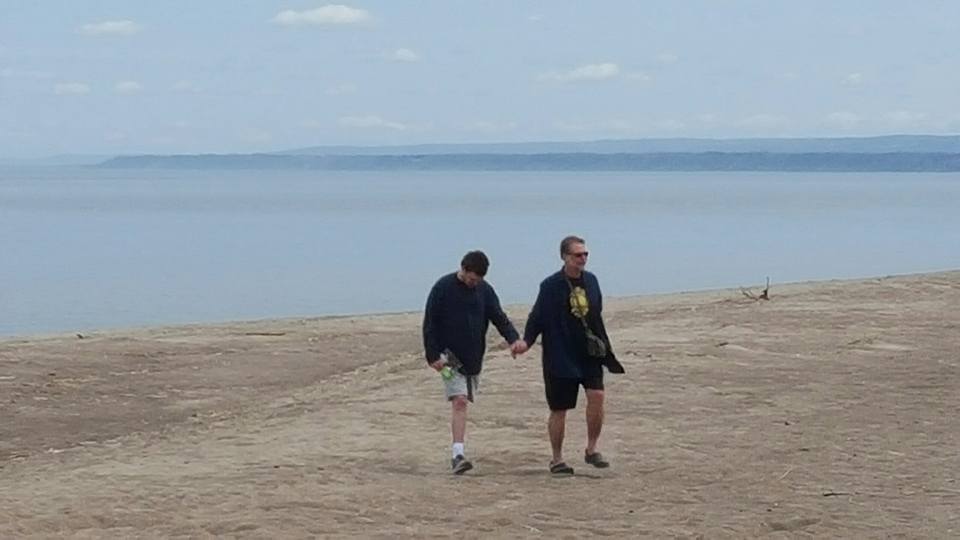
Ben and Me
~~~~~~~~
All photos by me unless otherwise specified.
